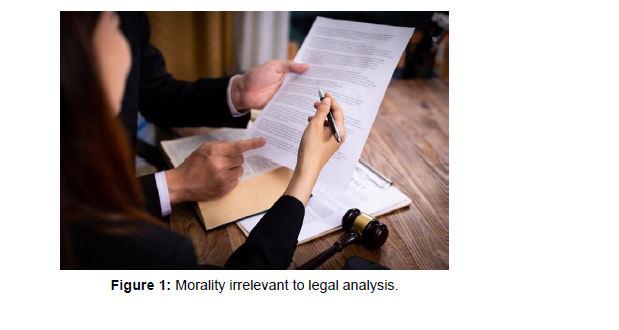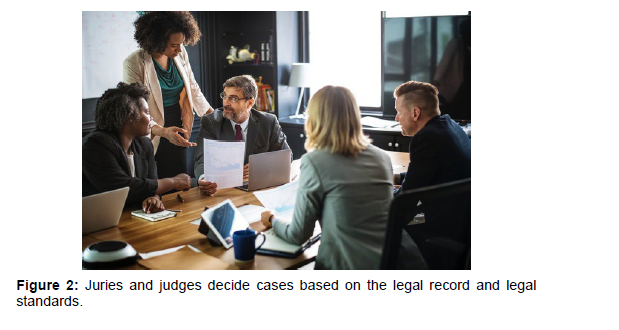Liberal Conception of Justice Biased in Favor of Social and Status Quo Economy
Received: 21-Aug-2023 / Manuscript No. JCLS-23-114850 / Editor assigned: 24-Aug-2023 / PreQC No. JCLS-23-114850 / Reviewed: 07-Sep-2023 / QC No. JCLS-23-114850 / Revised: 13-Sep-2023 / Manuscript No. JCLS-23-114850 / Published Date: 20-Sep-2023 QI No. / JCLS-23-114850
Abstract
The general requirement of public reason applies to judges faced with a conflict between faith and justice. Judges are officials of public institutions. Their deliberations result in political action by such institutions; their opinions constitute the justification for such actions. Therefore, judges should limit their deliberations to public reasons, and judicial opinions should not contain religious premises. This Part of the Article applies the theory to the problem of a nominee to the position of Supreme Court Justice who must consider what role her religious convictions should play in her future actions on the Court.
Keywords
Role of faith; Voluntary association; Sufficient consideration; Insightful analysis; Moral feeling; Slavery
Introduction
Two issues must be confronted in applying liberal political theory to the role of faith in judging. The first issue is whether it is possible to exclude religious convictions from the process of making legal decisions. The second issue is whether judges ought to exclude such convictions, even if it is possible to do so. Rather, in such cases choice could be left to the conscience of individuals and voluntary communities that is communities constituted by voluntary association [1]. We could adopt a principle that a judge may not decide to impose civil or criminal liability on the basis of non-public reasons, including religious reasons. These abstract considerations can be made more concrete by considering greenawalt examples and his analysis of them. Greenawalt considers two cases at the borderlines of status animal rights and abortion. In both of these cases, he argues that public reasons underdetermine important questions of political morality-questions like, what are our political obligations to foetuses and animals? There are, of course, legal issues that correspond to these questions, for example, whether foetuses deserve sufficient consideration to justify a state statute outlawing abortion? Let us suppose that this is a case in which neither the law nor public reasons provide a determinate resolution [2]. Greenawalt reasons that ordinary forms of reasoning leave open a number of possibilities about how far potentiality should count for the inherent worth of a being already living in some form, and thus leave open the way a fetus should be valued as it progresses. It is the passage that follows which contains the crucial assumption, if this conclusion is sound, and then people must resolve the status of the fetus on grounds that go beyond commonly accessible reasons [3]. If this is inevitable, the religious believer has a powerful argument that he should be able to rely on his religiously informed bases for judgment if others are relying on other bases of judgment that reach beyond common premises and forms of reasoning [4].
Methodology
The issue of faith and justice has been raised explicitly in the confirmation hearings of two of the three sitting Catholic Justices [5 ]. Sanford Levinson concludes his sensitive and insightful analysis of the confirmation of these Catholic Justices with the assessment that we do a fairly terrible job in the process of confirming Justices to the Supreme Court. Levinsons warrant for this assertion is that Justice Brennan and Justice Scalia were led to say things that they cannot possibly wish to have represented as their genuine reflections on complex and important matters [6]. In particular, both Scalia and Brennan made strong statements to the effect that their duty to apply the law implied a duty to exclude convictions of faith from any influence on their decisions [7].
Discussion
How are we to interpret Justice Brennan's assertion that he had an obligation under the Constitution which could not be influenced by any of his religious principles? What are we to make of Justice Scalia's statement that he would recuse himself from a case if he felt unable to separate his personal moral feeling from his duties as a servant of the law? In particular, is it possible not to be influenced by any of one's religious principles? Levinson accepts the proposition that a Justice of the Supreme Court may sometimes find that the only plausible interpretation of the Constitution will be inconsistent with morality or justice, he cites slavery as an example [8]. In these circumstances, Levinson believes it is possible to decide contrary to one's own beliefs or to abstain from decision [9]. What Levinson finds implausible is the suggestion that morality is irrelevant to legal analysis as shown in (Figure 1). At this point, it is important to be precise about exactly what sort of morality is at stake and what we mean by saying it is irrelevant to legal analysis [10]. Initially, it should be clear that Scalia and Brennan could not have been contending that their religion must be irrelevant or without influence in the sense that it not be allowed to play any causal role, even an unconscious role, in their decision making. Irrelevant in this context and charitably interpreted means irrelevant as a reason for decision [11]. The critical legal studies movement has made the even stronger claim that the law is radically indeterminate. If these claims are correct, then it does appear implausible to argue that a judge can make a legal decision without being influenced by some conception of political morality [12 ]. But it does not follow that judges must resort to morality in the sense that includes their own religious beliefs. Consider two different reasons for the conclusion that a judge is unable to put aside her own conception of the good, as a matter of moral psychology, people cannot disregard personal knowledge or values in deliberation, or, as a matter of political philosophy, there are political decisions that simply cannot be made on the basis of public reasons, even if it were psychologically possible to do so [13]. With respect to the first reason, I believe that the most plausible views of practical reason are consistent with the proposition that it is possible for a decision maker to set aside her own conception of the good in deliberation to set it aside as required by the requirement of public reason [14]. Certainly, it is a commonplace of the law that we ask juries and judges to set aside personal beliefs and values and to decide cases based on the legal record and legal standards as shown in (Figure 2). I am not sure whether everyone has the ability to do this well. It may be that no one can completely disregard non-public reasons but that some perhaps many can learn to deliberate in a way that substantially excludes such reasons [15].
Conclusion
Thus, it may be that the judicial virtues require careful cultivation, and that not everyone has judicial integrity. The second reason that a judge might be unable to put aside her own comprehensive conception of the good requires that we consider the question whether public reason can provide a basis for resolving important political questions. I will explore this issue by evaluating Kent greenawalts argument that occasional reliance by judges on religious convictions is not improper
Acknowledgement
None
Conflict of Interest
None
References
- Stebek EN (2018) Consumer protection law in Ethiopia: The normative regime and the way forward. J Consum Policy US 41:309-332.
- Dawar K, Ndlovu N (2018) A comparative assessment of competition in Africa: Identifying drivers of reform in Botswana, Ethiopia, and Nigeria. J Antitrust Enforc OUP UK 6:150-172.
- Stebek EN (2017) Deliverables and pledges under Ethiopian Trade Competition Law: the need for private sector empowerment and enablement.Miz L Rev EA 11:1-32.
- Shahid TN (2013) Islam and women in the constitution of Bangladesh: The impact on family laws for Muslim women.FLJS UK:1-11.
- Hossain K (2003) In Search of Equality: Marriage Related Laws for Muslim Women in Bangladesh.J IntWomen's Stud MA 5:1-38.
- Levitus S, John I, Wang J, Thomas L, Keith W, et al (2001) Anthropogenic Warming of Earth's Climate System. USA 292:267-270
- Shahid TN (2013) Islam and women in the constitution of Bangladesh: The impact on family laws for Muslim women.FLJS UK:1-11.
- Shehabuddin E (2008).Reshaping the holy: Democracy, development, and Muslim women in Bangladesh.CUP NY:1-304.
- Hossain K(2003) In Search of Equality: Marriage Related Laws for Muslim Women in Bangladesh.J IntWomen's Stud MA 5:1-38.
- Yoram J, Didier T & Olivier B (2002) A satellite view of aerosols in the climate system.Nature UK 419:215-223.
- Ramanathan P, Crutzen, J, Rosenfeld D (2001) Aerosols, climate, and the hydrological cycle. Nature UK 294:2119-24.
- Costanza R (2004) Estimates of the Genuine Progress Indicator (GPI) for Vermont, Chittenden County and Burlington, from 1950 to 2000. Ecol Econ 51:139-155.
- Lemaitre JC, Grantz KH, Kaminsky J, et al (2021) A scenario modeling pipeline for COVID-19 emergency planning. Scientific reports, 11(1), 1-13.
- Hassan A,Qadri MA,Saleem M (2021)The Muslim Family Law Ordinance 1961: Pioneer of Women Empowerment in Pakistan.JRSP PAK 58:1-8.
- Abdullah R,Monsoor T,Johari F (2015) Financial support for women under Islamic family law in Bangladesh and Malaysia. Taylor and Francis UK 21:363-383.
Indexed at, Google Scholar, Crossref
Indexed at, Google Scholar, Crossref
Indexed at, Google Scholar, Crossref
Indexed at, Google Scholar, Crossref
Indexed at, Google Scholar, Crossref
Citation: Heleba S (2023) Liberal Conception of Justice Biased in Favour of Socialand Status Quo Economy. J Civil Legal Sci 12: 404.
Copyright: © 2023 Heleba S. This is an open-access article distributed under theterms of the Creative Commons Attribution License, which permits unrestricteduse, distribution, and reproduction in any medium, provided the original author andsource are credited.
Share This Article
Recommended Journals
Open Access Journals
Article Usage
- Total views: 387
- [From(publication date): 0-2023 - Mar 12, 2025]
- Breakdown by view type
- HTML page views: 316
- PDF downloads: 71


